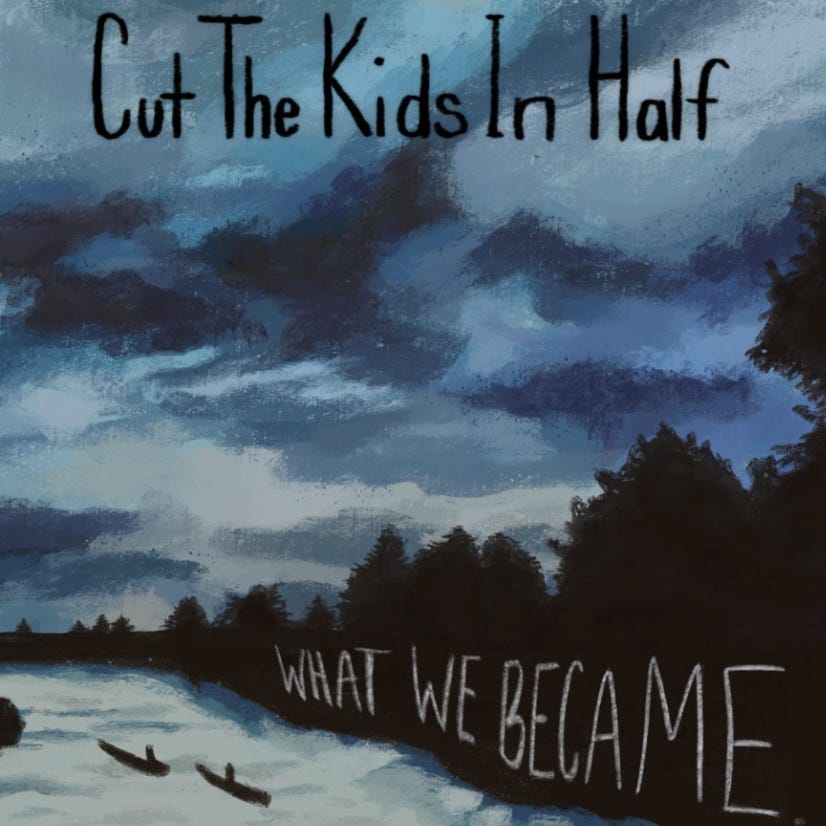Cut The Kids in Half: How a pair of teenage brothers wrote one of 2025's first great indie rock records
'What We Became,' the debut from Boston rockers Cut The Kids in Half, is out now

Jack is the older of the Silver brothers.
He’s the wordsmith, a writing & literature student at Emerson College in Boston’s Theater District.
The 19-year-old has been a poet and fiction writer since he was very young, but he never expected to be a musician. He rarely even sang in the car as a kid. Now, though, Jack’s the lead singer for Cut The Kids in Half, a five-piece rock band founded alongside his brother, Charlie.
“It continues to be my greatest passion,” he said of literature, in a recent Zoom interview. “It's somehow translated over into the musical world, which is not something I ever cared about when I was younger.”
Charlie is the younger of the Silver brothers.
He goes to school at Boston University, a half-hour away by train from his older brother. The 18-year-old is a bit more soft-spoken than Jack.
He’s the instrumentalist and has been playing guitar for almost a decade. At around 13 years old, he started writing songs, inspired by the classic rock — Led Zeppelin, The Beatles — the Silver brothers’ parents put them onto as kids.
Charlie’s songwriting piqued his brother’s interest.
“I started thinking, ‘Well, I could do that,’” Jack said. “Even though I have no musical talent whatsoever. I can't pick up a guitar and play anything other than one chord — and I do that pretty badly.”
Many of those songs, written by the Silvers as mere tweens, have evolved into the tracks that make up Cut The Kids in Half’s debut album What We Became, out now.
The album was largely recorded in New Jersey by Ray Ketchem, whose prior credits include The Cactus Blossoms and Guided By Voices. The band has expanded since those teenage days to include drummer Luke Tan, guitarist Kevin Mortenson and bassist-keyboardist-trumpeter Joey Sorkin.
Cut The Kids in Half is proud of their first album. But more than anything, the Silvers say they’re ready to release it and close this chapter of songwriting. These songs have been on their minds for most of their teenage years, after all.
“Obviously, you know, if Rolling Stone publishes our album and says it's the best album of all time, that's ideal,” Charlie jokes. “But a lot of what I'm thinking about is really more future-based. If we get this album done and we're proud of how we did it, then we can actually move on to making new music.”
Sorry, Charlie. I’m not Rolling Stone.
But I did love What We Became, a heater of an indie record with nine earnest, grandiose songs. Many of them evoke the emotional propensity of acts like Gang of Youths or The Head and The Heart. Perhaps that’s because of Jack’s baritone vocals, which, with their breathy, emotive drawl should easily draw comparisons to Dave Le’aupepe or Jonathan Russell.
“Riverbend,” the album’s penultimate 11-minute standout, is an early candidate for one of this year’s best rock songs. The trumpets burst at the end of several of the album’s meandering, prosaic verses. The literary lyrics check out with Jack’s background. They’re provocative and made of clay.
“Everybody’s on a one-way street,” goes one line. “And we’re driving down it faster each day it seems.”
“Old Manhattan” is another opus, a six-minute slow-burner with locomotive acoustic guitars and subtle orchestral accents.
The comparisons are fairly easy for Cut The Kids in Half. The catchiest of the album’s singles, “A Good Man Died,” is a must-listen for anyone as addicted as I was to British indie band Pynch’s synthy, thumping Howling at a Concrete Moon in 2023. When the band layers some fuzz onto Jack’s voice — on “Song of Two Humans” especially — it’s a dead ringer for Julian Casablancas.
Indeed, The Strokes are a major touchpoint for the Silvers.
When asked about their influences, the brothers are a jukebox of rock’s all-time greats. The Velvet Underground. Elliott Smith. Oasis. The Silver brothers have jokingly planned a Gallagher-style feud a few years from now to drum up controversy, despite the fact that they rarely even butted heads as kids.
“That’s to generate interest in the tour, obviously,” Jack said with a smirk.
Cut The Kids in Half’s moniker is a reference to a Radiohead lyric on “Morning Bell,” from Amnesiac. Jack and Charlie considered several options for the band name. They first hoped to use their last name, pairing it with another word “that sounded vaguely cool and esoteric,” Jack said. But all the Silver puns sounded too cheesy.
The Silvers? Taken. Silver Age? Nope.
They thought about a comma name, too — Black Country, New Road was a huge influence on their songwriting the last few years. “Cracked Eggs, Dead Birds” was an option, Charlie said. That’s also a Radiohead lyric (“Street Spirit”). It would be fitting, given their record’s BCNR-esque cinematic propulsion and abstract storytelling.
But ultimately, they settled on Cut The Kids in Half. Jack said they hoped to bear the torch of musical ancestry by naming their band after Radiohead the way Thom Yorke named his group after a Talking Heads track.
“It felt like carrying on a line of great rock artists,” Jack said, before re-writing his ambitions a bit. “Not to call ourselves great rock artists — the idea was to manifest it.”
The “Morning Age” lyric that has become Cut The Kids in Half’s namesake is ostensibly about divorce. There’s some discussion of parenthood on What We Became, too, most cleverly on track three “Run Kid.”
Run kid
Out of the death grip
Into a new life
So far away
Out of the gray sky
That poisons your blood line
Feeds into your panic
And keeps you in place
But the Silvers want to clarify that these are just stories.
“Our parents are both huge fans of our music and so supportive. When we were younger, they were showing us all new music, and now we show them new music,” Jack said.
“At least a few of the songs on this album are about parents, and it’s easy to misconstrue them for reality, because they’re dark, almost negative, songs. Our parents are beyond supportive.”
In fact, the album’s outro, “The Quiet Life of August,” was written as an ode to their mother when the Silver brothers were kids. She asked for a song for her birthday — at the end of August — and they granted it.
The song, released in 2022 as the band’s first ever single, came together in just one night. That’s a stark contrast to most of the songs on the album, which have been tweaked and changed for years, Jack said.
“Charlie came up with the riff, and I would come in, write a lyric, and then I would run out into the hallway,” he said. “And I would brainstorm for 20 or 30 minutes, then I would run back in.”
Despite the sweet backstory, the song itself is still a little bit brooding. That’s just how Jack writes, he said.
He doesn’t have any shame in being a little self-indulgent as a lyricist. He takes pride in being informed by all-time great “rock manifestos” from legends like Bruce Springsteen, the musical patriarch of the Silvers’ home state New Jersey.
When asked about how being from New Jersey shaped his songwriting, Charlie said he doesn’t feel like it influenced the instrumentation much, despite the fact that he loves plenty of local bands.
Jack, though, points to “Storm Drain Girls,” the crackling, piano-forward opener on What We Became. That’s the most Springsteenian track on the album. On it, Jack’s voice burns to a growl over verses about alcoholism and escape.
The storm drain girls mean nothing to me now
They’ll cause a raging tempest to seep silent underground
And I’ve seen beneath the sewers
I’ve learned what boys become
Men who trade their faces for the safety of their sons
“The lyrics are almost over the top and poetic to the point of irony,” Jack said. “It's almost so over the top of what a teenager would say when they're going through a breakup, or about to start a new chapter of their life, or trying to leave their hometown behind — all these very Springsteenian messages that shine through.”
That last part is perhaps the most Jersey thing about What We Became.
It’s about leaving.
“I think there is a certain element that comes from the Jersey heritage,” Jack said. “Even if it's about wanting to grow up and get the hell out of there.”
It’s most telling that the Silver brothers got the hell out of there together.
Once Jack went off to Emerson, Charlie zeroed in on Boston schools only for his own college search. He did it so they could keep playing music together, he said, like they have since they were kids.
College schedules are busy. Charlie’s studying electrical engineering. But Cut The Kids in Half keeps the kids whole. They see each other every week for band practice and writing sessions.
“We've always been close,” Jack said. “But if it weren't for music, I would probably see him every once in a while.”
The Silver brothers called into our Zoom interview separately. Part of the way through, Jack shared that he was planning to meet his younger brother for band practice as soon as the call ended.
So I wrapped up the conversation. They had places to be.
And this one-way street doesn’t have a speed limit.
Listen to What We Became by Cut The Kids In Half now, on Spotify and Apple Music.





